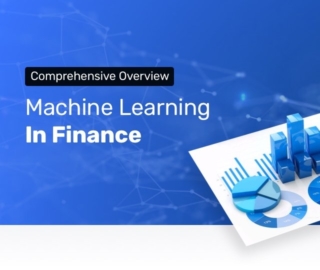
We previously covered the top machine learning applications in finance, and in this report, we dive deeper and focus on finance companies using and offering AI-based solutions in the United Kingdom. The UK government released a report showing that 6.5% of the UK’s total economic output in 2017 was from the financial services sector. As of now, numerous companies claim to assist financial industry professionals in aspects of their roles from portfolio management to trades.
We researched the space to better understand where AI comes into play in the UK finance sector and to answer the following questions:
- What types of AI-based applications are currently in use in the UK finance sector?
- What tangible results has AI driven in the UK finance sector?
- Are there any common trends among these innovation efforts? How could these trends affect the future of finance in the UK?
This report covers vendors offering software across three applications:
- Portfolio Management
- Automating Trade Execution
- Predicting Risk
- Improving Customer Experience
This article intends to provide business leaders in the UK finance space with an idea of what they can currently expect from Ai in their industry. We hope that this article allows business leaders in the UK finance space to garner insights they can confidently relay to their executive teams so they can make informed decisions when thinking about AI adoption. At the very least, this article intends to act as a method of reducing the time business leaders in the UK finance space spend researching AI companies with whom they may (or may not) be interested in working.
Automating Trade Execution
Man AHL by Man Group
Man AHL is a London-based company that offers a credit risk and credit scoring software solution which the company claims can help investment banks automatically execute trades using machine learning.
Man AHL claims traders can execute buy or sell orders and Man’s electronic trade routing software automatically chooses the best channel for the trade among internal execution algorithms, external dealer algorithms or the firm’s trading desk. Man claims their AI system is trained on historical data, such as data on commissions paid for historical trades on each execution channels.
Then, Man AHL trade routing software uses machine learning to learn the best channels through which to execute trades based on identifying the most optimized execution in historical data with the goal of minimizing commissions paid and limiting liquidity. The system then provides direct trades through one of the three channels, ensuring that all trades are executed optimally.
Below is a short 6-minute video demonstrating how Man AHL automates trade execution:
Man AHL exclusively uses their software internally, and so there are no available case studies for the software.
Man Group collaborated with The Oxford University to create the Oxford-Man Institute (OMI) with Professor Stephen Roberts. Roberts is the Director of Oxford-Man Institute, Royal Academy of Engineering and Man Group Research Chair in Machine Learning. He is a Fellow of the Royal Academy of Engineering, the Royal Statistical Society, and the Institute of Physics, and he is a Faculty Fellow of the Alan Turing Institute. Roberts is Director of the Oxford-Man Institute of Quantitative Finance, Co-Director of the Oxford Centre for Doctoral Training in Autonomous Intelligent Machines and Systems (AIMS), and co-founder of the University Machine Learning spin-out company, Mind Foundry.
Portfolio Management
StatPro
StatPro is a Wimbledon-based company that offers a software called StatPro Revolution, which it claims can help banks and financial institutions manage portfolios and assets better using machine learning.
StatPro claims users can log into a web portal and access insights about portfolio performance, risk, and compliance. StatPro Revolution uses data science to analyze over 3.2 million global securities, including equities, fixed income, mutual funds, listed futures contracts, FX forwards, interbank deposits, options, and OTCs and other benchmark indices, such as MSCI, Russell, FTSE, NASDAQ, and the license-free Freedom Index.
Then, StatPro Revolution reportedly uses machine learning to identify risk in portfolios by predicting the performance of securities using the historical and real-time data from the above-mentioned sources. The system then provides a performance index for a portfolio in the form of graphs and notifies traders of the more risky assets. The portfolio index is a way of measuring the portfolio performance by taking into account the actual returns of funds relative to the risk-return relationship.
Below is a 1-minute video demonstrating how StatPro Revolution works:
Our research yielded no results when we tried to find case studies for the software.
StatPro also lists WAY Group, FMConsult and L&G Unit Trust Managers as some of their past clients. We could find no funding information for the company although there seems to be some evidence of Statpro having acquired 6 companies such as Investor Analytics (IA) and InfoVest since its inception in 2006.
We were unable to find any C-level executives with AI experience on the company’s team. We caution readers to take this into consideration when determining potential vendors.
Predicting Risk
Kortical
Kortical is a London-based company with around 15 employees. The company offers a machine learning platform called The Kore, which it claims can help banks and other financial institutions with building and training AI systems for predicting risk or forecasting sales using machine learning.
Kortical claims businesses can integrate the Kore platform into existing business networks through an API. Data scientists at banks can use the Kore platform to develop forecast models, which can then be used by business analysts to see the predicted risks or sales forecasts on a web-based dashboard.
Kortical claims their Kore platform comes inbuilt with several predictive models, which can be chosen by the user based on the type of data they have or what the system needs to predict. Then, Kore platform reportedly uses AI to find and train the best model out of the existing models in the platform or suggest a reference model for data scientists to build upon. The system then provides predicted risk scores for securities in a portfolio for their future performance.
Kortical does not have a demonstration video available showing how its software works.
Kortical claims to have helped an unnamed investment bank speed up their trading risk-prediction process. According to Kortical, the bank needed to calculate the predicted returns on almost 5 million trades overnight everyday. The bank was previously using human analysts to help categorize the trades in ways that might help make this process faster but was constrained by the sheer number of trades.
Kortical’s website claims the bank deployed the Kore platform to create a predictive model to identify patterns that could speed up the process. According to Kortical, this resulted in the investment bank improving 30% in the overall time taken for the risk prediction process after a period of three days as compared to the human analysts.
There was no information on what other measures the investment bank took with regards to speeding up risk prediction or what the original time required for the process was using human analysts.
We were unable to find any mention of enterprise-level companies on Kortical’s website nor in any of their press releases. We were also unable to find any information about funding or venture capital that the company may have raised.
Alex Allan is CEO at Kortical. He holds a PhD in Data Science from University of Reading. Previously, Allen served as Chief Data Officer at London-based startup Datamind.
Improving Customer Experience
Presidion (Formerly SPSS Ireland)
Presidion is a Dublin-based company with 15 employees. The company offers a software called IBM SPSS Text Analytics, which they claim can help financial information management service providers with improving customer experience using machine learning.
Presidion claims users can use the IBM SPSS Collaboration & Deployment Services, IBM SPSS Modeler, and IBM SPSS Statistics software offered by them to build a predictive analytics platform for growing customer relationships. Data from Core (Centralized Online Real-time Exchange) banking transactions account processing, person-to-person payments, mobile payments, electronic funds transfers, and e-bill payments can be used to improve the customer experience for a bank’s audience.
Presidion’s predictive analytics software analyzes the data to predict the most-likely next purchase for every customer. Customer buying patterns are coaxed out of the historical banking data, which can be used to develop personalized banking products tailored to each customer. The software might also help banks and financial institutions predict a lifetime value for each customer based on the banking data.
This would enable banks to ensure their customer support teams are spending more time on resolving issues for their most valuable customers. The system then also provides insights for improving customer relationships, which are then fed into business intelligence dashboards to present the findings to bank employees.
Presidion does not have a demonstration video available showing how its software works in predictive analytics applications in finance.
Presidion claims to have helped Fiserv create an information management product that helps Fiserv’s clients (Small, mid sized banks and credit unions) to attract, retain, and grow profitable customer relationships. Fiserv was collecting vast amounts of data from their existing customers and deployed the Presidion predictive analytics solution. The software was reportedly able to create profiles for customers and predict their purchase behavior.
Presidion claims to have worked in projects with companies such as Daimler, HONDA, and banks like Bancolombia and Rabobank.
We could not find any evidence of previous AI-related experience on Presidion’s leadership team.
Takeaways for Business Leaders in the UK Finance Sector
Among the companies we researched for this report, there seems to be a lot of traction in the UK with regards to using machine learning to predict risk in the financial sector. Banks in the UK, such as the Bank of Ireland or Lloyd Banking Group, are engaging in machine learning projects for such applications.
Automating trade executions might still be a nascent application for machine learning in UK finance, but with advancements in data collection and organization methods, we expect that machine learning might be deployed for optimizing trade processes much more in the next two to five years.
Man Group is among the larger investment management firms in the UK that are actively applying AI to improve internal processes. In addition, Man AHL also operates an AI hedge fund that uses machine learning to identify the most profitable trades.
Kortical, StatPro and Presidion are relatively smaller firms and could possibly give an idea about the level of proliferation of AI in the UK. It seems as though there are several startups actively engaging in AI projects in the finance space, although many are still small and have not established themselves in the market yet.
Some of the larger banks in the UK have collaborated with AI vendors in the US, possibly again due to the higher levels of trust in the use-cases. Yet with the UK government investing resources into the development of AI, we can expect many more firms to crop up in the UK that cater to the needs of banks, credit unions, and other financial institutions.
In the near term, financial institutions should not expect to easily be able to automate their business processes or gain business intelligence from their data without embarking on a lengthy integration process starting with managing and organizing their data. This might additionally require discussions with vendor support representatives and large upfront costs. The largest enterprises may have the budget and staff to pursue the technology, but based on our research, it is as of right now only accessible to companies that would be able to afford AI applications.
Header Image Credit: MarketWatch







